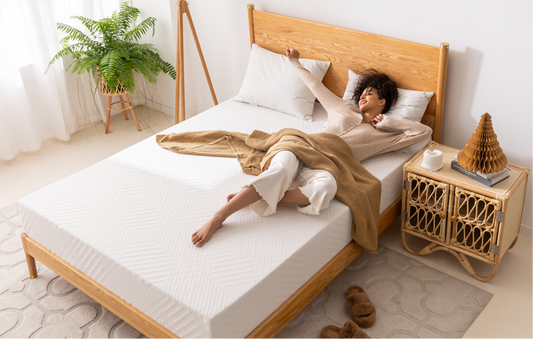It seems like there might be a slight contradiction in this topic—getting 8 hours of sleep in 4 hours of sleep might be challenging as the recommended duration for a healthy night's sleep is generally 7-9 hours. Most adults require approximately 7 hours of sleep every night, while teenagers need 9 hours because their brains are still developing.
However, if you're aiming to optimize the quality of your sleep within a shorter timeframe, focusing on improving your sleep environment, including mattresses and pillows, can be a valuable angle for you.

Understanding Sleep Cycles
Following are stages of the sleep cycle:
Stage 1: Light sleep is the first stage of the sleep cycle, lasting between five and ten minutes on average During this stage, the body and mind slow down, making us feel relaxed.
Stage 2: During the second stage of sleep, still called light sleep, eye movement, brain waves, and muscle activity begin to slow down so the brain can prepare for deep sleep.
Stages 3 and 4: It is more difficult to wake up during slow-wave sleep's third and fourth stages. During this portion of sleep, the body muscles relax so that the joints relax and breathe, and blood pressure and body temperature decrease significantly.
Stage 5: During the last phase of sleep, the body enters REM (rapid eye movement) sleep. We dream and experience a host of electrical and physiological responses similar to waking up in REM sleep. Heart rate, blood pressure, and breathing can become irregular, fast, and shallow.

Importance of a Good Mattress
A good mattress plays a crucial role in promoting quality sleep and overall well-being.
Here's why it matters:
Spinal Alignment: A quality mattress supports proper spinal alignment, which is essential for a restful sleep. It helps maintain the natural curvature of the spine, reducing the risk of back pain and discomfort.
Pressure Point Relief: A mattress that conforms to the body's contours helps distribute weight evenly, relieving pressure points. This is especially important for areas like the hips and shoulders, enhancing comfort and minimizing tossing and turning during the night.
Quality of Sleep: The right mattress contributes to a deeper and more restorative sleep. It can impact the duration and effectiveness of each sleep cycle, leading to improved overall sleep quality.
Allergen Control: Modern mattresses often come with hypoallergenic materials, helping to minimize allergens like dust mites. This is beneficial for individuals with allergies, promoting a healthier sleep environment.
Motion Isolation: A good mattress reduces motion transfer, ensuring that movements from one side of the bed don't disturb the other sleeper. This is particularly important for couples sharing a bed.

Long-Term Health: Consistently poor sleep due to an inadequate mattress can contribute to long-term health issues, including chronic pain, stress, and a weakened immune system. Investing in a quality mattress is an investment in long-term health.
Lifespan of a Mattress and Replacement Timing
The lifespan of a mattress varies depending on factors like the type of mattress, quality, and usage. On average:
Innerspring Mattresses: Typically last about 7-10 years.
Memory Foam Mattresses: May last 10-15 years.
Latex Mattresses: Can have a lifespan of 15 years or more.
Signs that it might be time to replace a mattress include:
Sagging: Visible sagging or indentations in the mattress surface.
Discomfort: Waking up with aches and pains.
Allergies: Increased allergy symptoms despite regular cleaning.
Noise: Creaking or squeaking sounds when moving on the mattress.
Uneven Wear: Uneven wear and tear, especially if the mattress is no longer providing adequate support.
Choosing the Right Mattress
Firmness: Consider personal preference and sleeping position. Back sleepers may prefer medium to firm, while side sleepers might opt for a softer mattress for better pressure point relief.
Material: Different materials offer varying levels of support and comfort. Memory foam provides contouring. Innerspring mattresses offer a traditional feel.

Sleeping Position: Match the mattress to your sleeping position. Side sleepers may benefit from a softer mattress, while back and stomach sleepers often prefer firmer options.
Trial Periods: Opt for mattresses with trial periods. Many companies offer a trial period during which you can return the mattress if it doesn't meet your expectations.
Budget: While quality is crucial, consider your budget. There are high-quality mattresses available at various price points.
Ultimately, choosing the right mattress involves considering personal preferences, sleep habits, and budget constraints to ensure a good night's sleep and long-term satisfaction.

Is It Healthy?
When looking for answers to how to sleep 8 hrs in 4 hrs? It is important to first find if it is healthy for the body. Getting less sleep can be detrimental to your health. Getting less sleep can have impacts like drowsiness, sleep deprivation, sleep disorders, and accidents.
What is clear is that investing in a quality mattress is essential for achieving restorative sleep and overall well-being. By investing in a quality mattress and creating an optimal sleep environment, individuals can maximize their chances of achieving the restful and rejuvenating sleep necessary for overall health and well-being.


